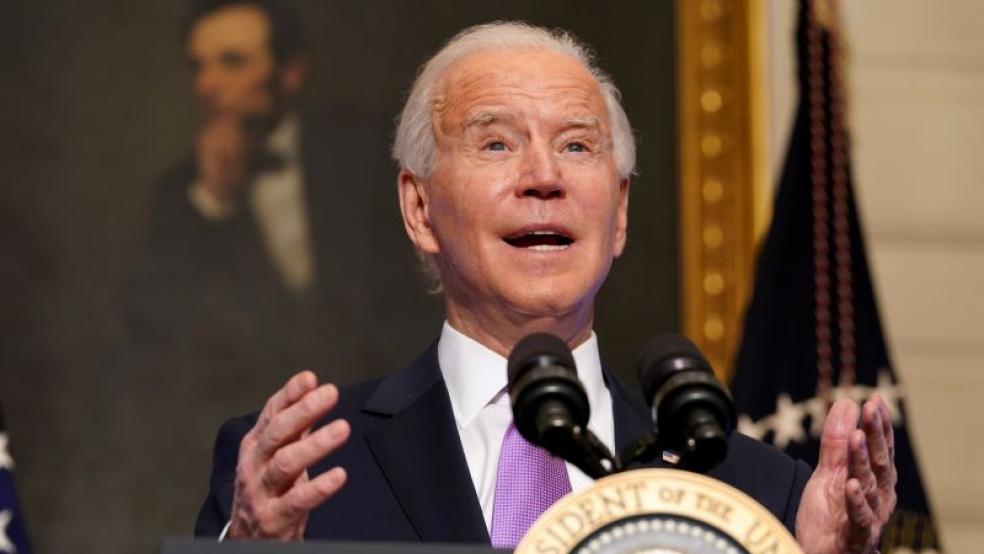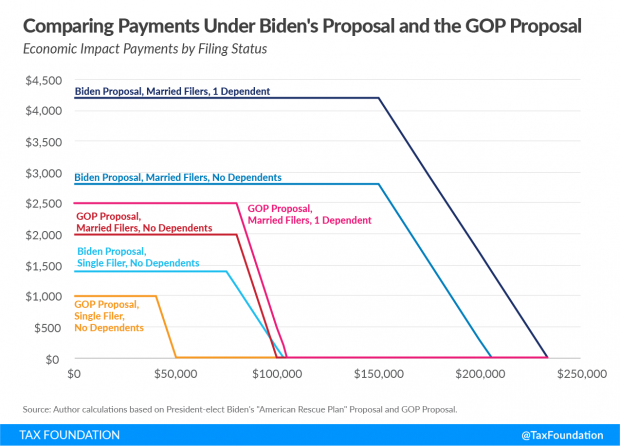The White House called President Biden’s Monday meeting with 10 Republican senators who are proposing a smaller Covid relief bill “substantive and productive.” Sen. Susan Collins (R-ME), one of the senators present, said the discussion was “excellent” and that talks would continue at the staff level. But White House Press Secretary quickly signaled that, while Biden was willing to continue talks, he is nowhere near ready to scale back his demands as sharply as the GOP senators have suggested.
“While there were areas of agreement, the President also reiterated his view that Congress must respond boldly and urgently, and noted many areas which the Republican senators' proposal does not address,” Psaki said in a statement. “He reiterated that while he is hopeful that the Rescue Plan can pass with bipartisan support, a reconciliation package is a path to achieve that end. The President also made clear that the American Rescue Plan was carefully designed to meet the stakes of this moment, and any changes in it cannot leave the nation short of its pressing needs.”
Biden himself reportedly reiterated that message Tuesday in a call with Senate Democrats during which he urged them to go big on the next round of relief spending and made clear that he sees the $618 billion Republican proposal as inadequate.
“President Biden spoke about the need for Congress to act boldly and quickly. He was very strong in emphasizing the need for a big, bold package. He said that he told Senate Republicans that the $600 billion that they proposed was way too small,” Senate Majority Leader Chuck Schumer (D-NY) told reporters, according to The Washington Post. Biden is also on board with congressional Democrats pushing ahead with the budget reconciliation process that would allow them to pass a package without GOP support, Schumer said.
What Biden is willing to negotiate: A White House spokeswoman told the Post that Biden is open to reducing eligibility for another round of stimulus payments, but he does not want to cut those payments below $1,400 per person, which would be in addition to the $600 payments Congress approved in December.
“The President remains committed to finishing the job on delivering $2,000 in direct relief to Americans who are struggling to make ends meet during this crisis,” White House spokeswoman Rosemary Boeglin said in a statement to the Post.
Republicans and some Democrats have expressed concerns that the payments Biden has proposed would go to some higher-income households that don’t need the aid, with some families making as much as $300,000 a year getting some aid. The current Democratic plan would start to phase out those payments for individuals earning more than $75,000 a year and couples making $150,000. The Senate GOP plan calls for lowering the income thresholds to $50,000 for individuals ($100,000 for couples) and cutting the size of the checks to $1,000.
Biden’s plan would send payments to about 95% of taxpayers while the Republican plan would provide payments to about 75%, according to an analysis by the conservative-leaning Tax Foundation.
The difference translates to 80 million fewer people getting payments under the GOP plan, according to an analysis by the left-leaning Institute on Taxation and Economic Policy cited by the Post’s Jeff Stein.
The GOP proposal would cost about half as much as Biden’s — about $184 billion vs. $441 billion, according to the Tax Foundation or $220 billion vs. $465 billion according to other estimates.
Some economists have argued that the payments are poorly targeted and less effective as stimulus, with higher-income households far more likely to save the money or use it to pay down debt rather than spend it. “Other economic experts have urged the White House not to target the checks too narrowly,” Stein reports. “They note that the payments are based on prior-year income and that lowering the threshold may exclude millions of people who recently lost their jobs.”
What it all means: The White House is making clear that Biden is willing to negotiate some details of the relief bill but won’t bend to GOP calls to dramatically scale back the package. The two sides remain more than $1 trillion apart, and Democrats are moving ahead with their preparations to pass Biden’s plan without GOP support. The Senate on Tuesday afternoon voted 50-49 to proceed with the budget resolution needed to pass a Covid relief bill via reconciliation.
That reconciliation process could be bumpy — and it could have unintended consequences.
Sen. Joe Manchin (D-WV), a key centrist, said Tuesday that he would support the Democratic budget resolution but urged party leaders to pursue a bipartisan deal. “Manchin’s remarks signal that even though he will support fellow Democrats on a key procedural vote to set up passing a COVID-19 relief package, he could still block any package that leadership tries to pass solely with Democratic votes under the budget reconciliation process,” The Hill’s Alexander Bolton says.
And under the Pay-As-You-Go Act of 2010, known as PAYGO, passing a relief package by reconciliation could force unwanted automatic cuts to Medicare. Avoiding those cuts would require 60 votes in the Senate, meaning that some Republicans would have to agree. “Alternatively, Democrats could negate the automatic cuts if they raise taxes to prevent adding to the debt, or by abolishing the legislative filibuster, another political can of worms,” NBC’s Sahil Kapur reports.






